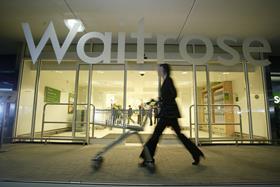
Supermarket sales have accelerated again as shoppers ate at home during the second national lockdown.
Figures from Kantar for the 12 weeks to 29 November show take-home grocery sales rose by 11.3 per cent, the fastest rate of growth since August. Take-home sales during the past four weeks increased by 13.9 per cent, as eating and drinking out of home was restricted by the English national lockdown.
Fraser McKevitt, head of retail and consumer insight at Kantar, said: “The three days before non-essential retail and hospitality closed on 5 November were especially busy, with grocery sales that week up by 17 per cent. November as a whole saw shopper frequency hit its highest level since the beginning of the pandemic, suggesting more confidence among people going into stores.
'Those factors contributed to November being the single largest month ever for the supermarkets, with £10.9 billion spent over four weeks. December’s numbers are likely to surpass that again, and we expect spend to be close to £12bn in the month ahead, around £1.5bn more than last year.”
After a tough 12 months for many people, Christmas has given shoppers a reason for celebration. Some 42 per cent of Britons said they are pushing to make this 'the best Christmas in memory', with a major spend on Christmas food predicted. Limited opportunities to drink in pubs and restaurants is exacerbating that trend.
Countdown to Brexit
There remains nervousness around what the end of the Brexit tranistion period will bring, particularly if no deal is reached with the EU. Shoppers, retailers, and suppliers will all be hoping that grocery price inflation, which is currently running at 1.4 per cent, remains relatively benign. The average British household has spent a record £4,206 on groceries so far in 2020, meaning that even moderate price increases could result in the need to balance household budgets next year, according to Kantar.
Online shopping has been one of the major trends of 2020, and in November more than six million households bought from a grocer via the internet, the highest ever. Renewed lockdown protocols saw the share of overall market sales made online reach a record 13.7 per cent.
Supermarket sales soaring
Ocado demonstrated the trend, growing by 38.3 per cent in the latest 12 weeks, a period that also fully covers the time since Ocado started selling M&S products, during which its share of the chilled ready meals market has tripled to just over three per cent. Waitrose also increased sales by 13.2 per cent, its fastest rate of growth since 2005.
Both Iceland and Lidl found success by encouraging shoppers to fill their trolleys. “Just over a quarter of Iceland’s 21 per cent growth came from the freezer aisles, with fruit, vegetables and household cleaning products also growing quickly,' McKevitt pointed out. 'With shoppers buying more completely across the store, the average trip to Iceland now totals £18.21, 44 per cent more than a year ago.
'Meanwhile, Lidl reached a new record market share of 6.2 per cent, as sales grew by 13.9 per cent. More than two-thirds of the growth was from trips over £60, as coupons and offers on the Lidl Plus app incentivised customers to spend more in store.”
Co-op’s growth increased to 9.8 per cent, with the convenience retailer holding on to a market share of 6.3 per cent. Aldi’s sales were up by 7.0 per cent, with a 7.7 per cent share of the market.
At Morrisons, increases both in store and online helped to grow sales by 13.7 per cent, gaining 0.2 percentage points of market share to stand at 10.3 per cent. Sainsbury’s share remained steady at 15.7 per cent, with sales up by 10.8 per cent in the latest 12 weeks. Tesco’s sales rose by 10.4 per cent, and Asda’s by 7.7 per cent.



